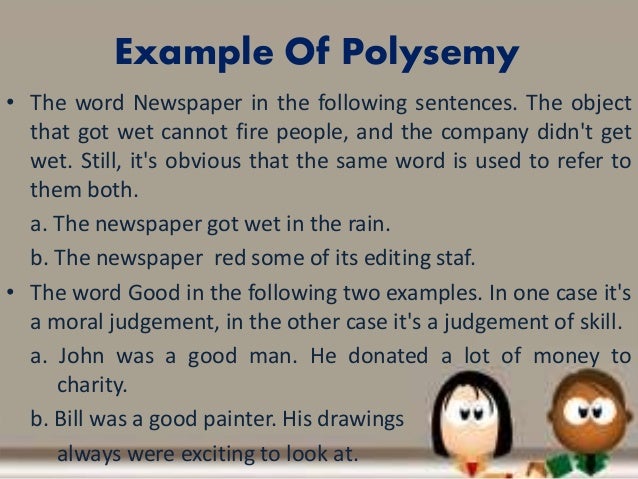- I. Polysemy
Polysemy is the existence of several meanings for a single word or phrase. The word polysemy comes from the Greek words πολυ-, poly-, “many” and σήμα,sêma, “sign”. In other words it is the capacity for a word, phrase, or sign to have multiple meanings i.e., a large semantic field. Polysemy is a pivotal concept within the humanities, such as media studies and linguistics.
polysemy is the state or phenomeneon in which the word that more than one meaning in other word it can be describe as multiplemeaning of word the word are considered etymmhologycally
the concrete form of polysemy is called polyseme : exsample
A word like walk is polysemous:
- I went walking this morning
- We went for a walk last Sunday
- Do you walk the dog every day?
- I live near Meadow Walk Drive
- The wardrobe is too heavy to lift; we’ll have to walk it into the bedroom (move a large object by rocking).
- She walks the tower (to haunt a place as a ghost).
- The workers threatened to walk (to go on strike).
- Walk with God! (to live your life in a particular way)
Homonymy
The word homonym comes from the Greek ὁμώνυμος (homonumos), meaning “having the same name”, which is the conjunction of ὁμός (homos), meaning “common” and ὄνομα (onoma) meaning “name”. In other words, homonymy refers to two or more distinct concepts sharing the “same name”
a figureof speech in which one word or phrese is subtitude for another it with which closely associated example
 http://grammar.about.com/od/pq/g/polysemyterm.htmhttp://grammar.about.com/od/pq/g/polysemyterm.htm
http://grammar.about.com/od/pq/g/polysemyterm.htmhttp://grammar.about.com/od/pq/g/polysemyterm.htm
a figureof speech in which one word or phrese is subtitude for another it with which closely associated example
 http://grammar.about.com/od/pq/g/polysemyterm.htmhttp://grammar.about.com/od/pq/g/polysemyterm.htm
http://grammar.about.com/od/pq/g/polysemyterm.htmhttp://grammar.about.com/od/pq/g/polysemyterm.htm
Examples include the following nouns, verbs and adjectives:
- Fleet: all the ships of a nation’s navy, e.g., The Greek fleet disappeared behind the huge mountains.
- Fleet: a number of road vehicles, boats, or aircraft owned, working, or managed as a unit, usually by a commercial enterprise e.g., The new company has a large fleet of service vehicles.
- Plane, e.g., I like to travel by airplane.
- Plain, pronounced the same but spelt differently, means clearly visible, e.g., The wallet was in plain view.
- Sow, the verb, means to plant seeds, e.g., He sowed the seeds of revolution.
- Sow, the noun, refers to an adult female pig, e.g., Have you fed the sow?
- Bank, the noun, means a business offering financial services, e. g., He went to the bank to deposit some money.
- Bank, the noun, refers to the steep side of a river, stream, lake, or canal, e.g., We climbed the river bank safely.
- Bank, the noun, also refers row of similar things, e.g., There was a bankof switches on the wall.
- http://grammar.about.com/od/pq/g/polysemyterm.htmv

Tidak ada komentar:
Posting Komentar